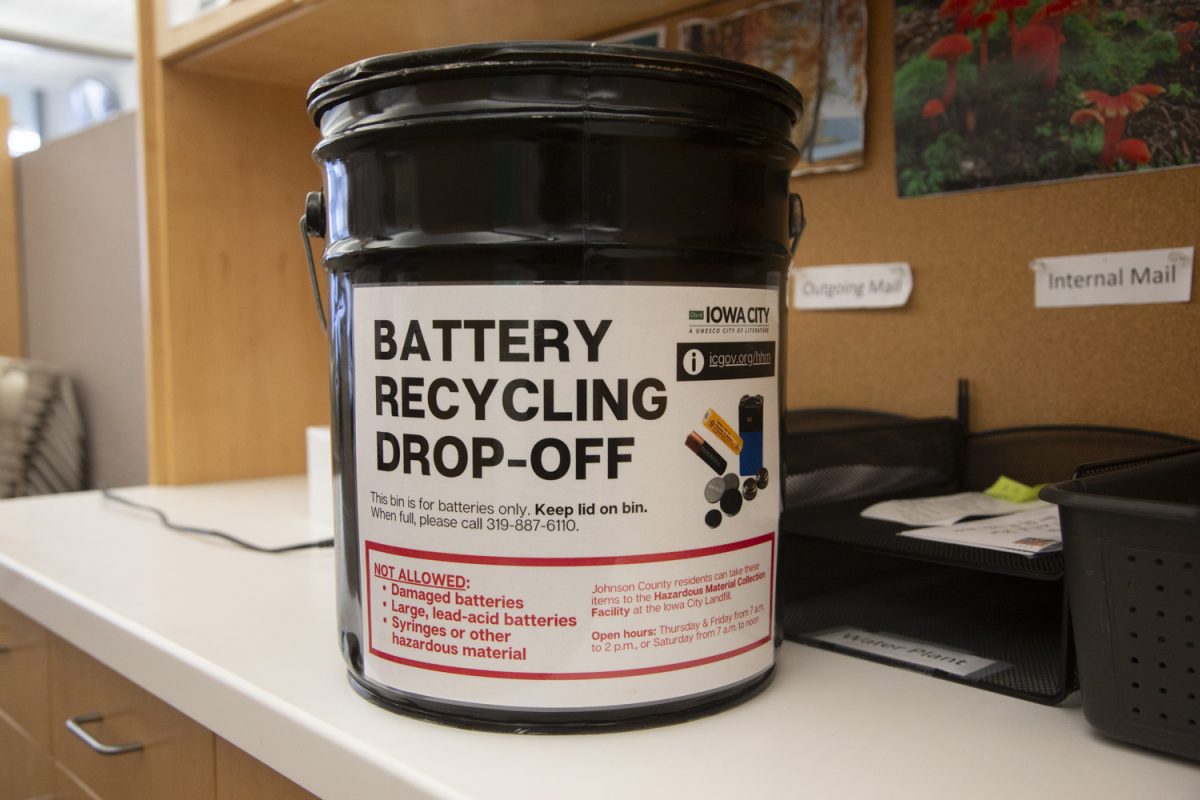When it comes to switching out batteries for electronics or tools, many individuals simply toss the old ones out into the trash.
The U.S. Environmental Protection Agency finds that everyday batteries made with alkaline and zinc carbon can be safely disposed of in household trash cans. More powerful batteries, however, can cause fires and explosions if disposed of improperly.
The University of Texas at Dallas found used batteries can contain enough energy to create fires, explode, and release hazardous materials into the environment, which can then enter water sources while causing pollution.
Iowa City Landfill has experienced five fires since the beginning of this year, with suspicions that most, if not all, were ignited by improperly thrown away batteries.
To suppress these fires, protect the environment, and prevent potential harm to human health, several locations throughout Johnson County provide battery-drop off services.
Residents can drop off single-use and rechargeable batteries at the Iowa City Fire Station 2, the North Liberty Community Center, the Coralville Community Center, and other locations.
Other types of batteries can be dropped off at the Hazardous Material Collection Facility at the Iowa City Landfill.
Iowa City Recycling Coordinator Jane Wilch said the increase in battery-caused fires at the Iowa City Landfill has showcased the importance of drop-off sites.
“One small battery, it contains a lot of energy, and if that battery becomes damaged, or if it becomes overheated, it has the potential to start a fire,” Wilch said.
Wilch said the program began five years ago in 2020 and has continued to expand along with an increase in usage.
In 2024, over six tons of batteries — equaling over 12,000 pounds — were safely collected and properly disposed of through the drop-off program, Wilch said. The batteries are collected weekly and transported to the hazardous material collection facility, where hazardous material operators prepare batteries for safe transportation.
RELATED: Iowa City sees increase in battery fires at landfill
Different types of batteries are recycled by various companies, such as alkaline batteries that go to a recycling company in Des Moines or lithium and rechargeable batteries that go to Call2Recycle, which is a battery recycling program based in Georgia.
In addition, Wilch said the recycling process helps recover valuable materials like precious metals.
“Not only are we improving safety and preventing fires, but we’re also recovering more materials and keeping those materials out of the landfill,” Wilch said.
Being able to recover materials from used batteries is one driving factor across the country as well.
In 2023, the U.S. Department of Energy found that 175,000 tons of materials were retrieved from batteries in processing facilities. It also discovered that in the coming years, those facilities will be able to process close to 200,000 additional tons of materials to aid in electric vehicle development.
Community Relations Director of North Liberty Nick Bergus said North Liberty partners with Iowa City to ensure the safe disposal of batteries while also ensuring their visibility is crucial for proper use.
Bergus emphasized the importance of making residents aware of the drop-off sites and their locations, noting that people are more likely to dispose of batteries properly if it is easy.
“We know that people rely on if something is easy to do, people are more likely to do it, so if they have to drive to the landfill to throw away their batteries, they’re probably not going to do it,” Bergus said. “We can make sure that those are available in places that they already go — whether that’s city hall, the library, or the rec center — they’re more likely to dispose of those properly.”
In the future, Bergus said North Liberty will continue to partner with Iowa City for best practices and inspiration.
Jim Pyrz, University of Iowa assistant director and environmental safety manager at the Environmental Health and Safety Office, said his office ensures safe battery disposal by providing services throughout the UI.
“EHS provides pickup and disposal service for University of Iowa departments with hazardous batteries,” Pyrz said in an email to The Daily Iowan. “EHS will ensure that batteries it collects are properly disposed of or recycled.”
From 2023-24, the Environmental Health and Safety Office recycled over 6,000 pounds of batteries.



